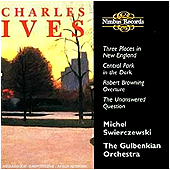
ESSENTIAL RECORDINGS

Charles Ives was an American composer who lived from 1874 to 1954. He earned his living as an insurance agent by day, so he could put together his music
at night and on weekends. I say "put together" instead of compose because that is what most of his music sounds like. A collage of disembodied fragments from traditional
American folk music, taken from hymns and spirituals, folk ballads, military songs, tunes from small town marching bands, Christmas songs, etc....it's almost as
if Charles Ives was a medium for ghosts of music past. His technique has been described as polytonal, polyrhytmic, pantonal, using tone clusters, quarter tones,
etc., but I don't think it was a technique. I believe Ives was able to paint a picture of American life by bringing together different strands of music from recent and distant eras, and combining them into a pastiche of clashing sounds to great effect.
Take for example "Putnam's Camp, Redding, Connecticut", the second section of "Three Places in New England". It's as if all the ghosts of previous marching bands celebrating the 4th of July, are marching through the park, or through Ives' memory, all at the same time, creating a time capsule of American history.
Another great example is "Central Park in the Dark". Those rustling strings, creating the illusion of quiet stillness at night, being interrupted by flashbacks of noisy hustle and bustle in and around the park during the day, again pasting together music from different times into one singular event.
It's almost as if his music displays different personalities all at once, and therefore conjures up different meanings, as in "The Unanswered Question", with it's lonely trumpet against a backdrop of infinite space and time, asking a profound question and getting no resolution. Now it could be a metaphysical question or, as Bernstein once pointed out, it could be a musical question, or it could be a question to oneself without a satisfactory response.
This recording brings together the essential Ives. The works that best describe Ives in a nutshell. A strange and unique composer, forging his own language, and leaving us with many unanswered questions indeed. In the meantime, let's just absorb and enjoy the spirits of music past.
Jean-Yves Duperron